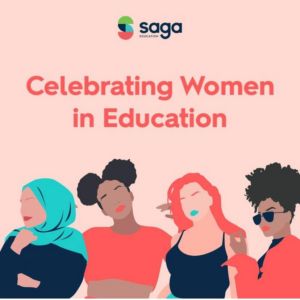Celebrating 8 Influential Women in Education for International Women’s Day
March 8, 2021Today, Monday, March 8th we are taking time to celebrate International Women’s Day by honoring nine influential women in education that have helped pave the way for future generations.

Michelle Obama
During her tenure as First Lady, Obama launched Let Girls Learn, a U.S. government initiative aimed at helping adolescent girls attain a quality education that empowers them to reach their full potential. Globally, 62 million girls are not in school, even though education leads to girls earning higher salaries, marrying later, and having healthier families. Educating girls leads to economic and social development resulting in more stability in countries around the globe. Obama took it upon herself to not only become a voice for the increase in education of girls around the world, but worked nationally to empower them to become leaders and grow into their full potential.
Malala Yousafzai
Malala grew up in Mingora, Pakistan. Her father wanted her to have every opportunity a boy would have, so he ran and taught an all-girls school in their village. When she was 10, the Taliban took control, enforcing bans on everything from owning a television to girls going to school. In 2012, Malala spoke out publicly on behalf of girls and their right to learn, making her a target for the extremist group. On her way home from school, a gunman boarded her school bus and shot her. She awoke 10 days later in Birmingham, England.
She knew she had a choice: either live a quiet life or dedicate her time and energy to fight for girls’ education around the globe. Fortunately for everyone, she chose the latter.
In 2020, she graduated from Oxford University, and continues to fight to ensure that every girl receives 12 years of free, safe, and quality education with her organization the Malala Fund.
Dr. Hayat Sindi
Dr. Hayat Sindi is a biotechnologist who is best known for creating low-cost devices that can be used in developing countries to help diagnose a range of diseases quickly and on-site. She is an advocate for science in schools, starting at an early age.
Dr. Hayat has said since the fundamentals of science never change, an early introduction in school is key. Her belief is by pairing structured learning with practical experimentation will lead to developing life-long learners.
Nikole Hannah-Jones
Nikole Hannan-Jones is a Pulitzer Prize-winning reporter and creator of the 1619 Project. Published by the New York Times, her 1619 Project commemorated the 400th anniversary of the beginning of slavery of what would become the United States. It examines slavery’s legacy and reframed the way students understand history and contributions of Black Americans to the nation. Random House will be adapting the project into a graphic novel and publications for younger readers, making the program accessible to kids of all ages.
Beyond the 1619 Project, Hannah-Jones has tackled writing about school resegregation and the failure of the federal government to enforce the 1968 Fair Housing Act.
Marian Wright Edelman
Marian Wright Edelman got her start as a civil rights activist, transitioning her focus to become a children’s rights activist. With this shift, she founded the Children’s Defense Fund. By founding the Children’s Defense Fund, she was integral in creating a strong and effective voice for all children who cannot vote, lobby, or speak for themselves. While she advocated for all children, she also paid particular attention to children of color, those with disabilities, or those who came from under resourced communities.
While at the helm of the organization, she persuaded Congress to overhaul the foster care system, support adoption, make meaningful improvements to child care, and instill protections for children who are disabled, homeless, neglected or abused.
Rita Pierson
Rita Pierson is an advocate for students. As a professional educator since 1972, she’s taught elementary and junior high school, along with special education. Pierson has been a counselor, a test coordinator, and an assistant principal, supporting and advocating for her students at every twist and turn.
Her lectures included topics like “Helping Under-Resourced Learners,”“Meeting the Educational Needs of African American Boys,” and “Engage and Graduate your Secondary Students: Preventing Dropouts.” And her groundbreaking TedTalk encouraged every educator to take a vested interest in their student’s lives, because every child needs a champion.
Dr. Bettina L. Love
Dr. Bettina L. Love is a pioneer in establishing Abolitionist Teaching, working to restore humanity for children in schools. While abolitionist teaching appears differently in every school, it always comes from a critical race lens and applies methods like protest, boycotting, and calling out leadership who are racist, homophobic, or Islamophobic.
Her activism, writing, research, and teachings meet at the intersection of race, education, abolition, and Black joy. Dr. Love’s concern with how educators work with communities and parents of students to build communal, civically engaged schools rooted in Abolitionist Teaching.
In 2020, Dr. Love co-founded the Abolitionist Teaching Network (ATN) with the mission to develop and support teachers and parents to fight injustice within their schools and communities.
Ramona Edelin
Ramona Edelin is an educational activist and is credited with the feat of introducing the term “African American” into the general vernacular. Today, she serves as executive director of the DC Association of Charter Schools.
She has served as president and CEO of the National Urban Coalition, she initiated Say Yes to a Youngster’s Future program, which gave math, science, and technology assistance to youth and teachers of color in city settings. The activity-based instruction as a vehicle for increasing student interest and achievement, not only in science and mathematics but also in reading. With the help of the National Science Foundation’s Urban Systemic Initiative
Under the National Science Foundation’s Urban Systemic Initiative, the program was brought to over 200 schools nationwide, and was eventually partnered with the Laboratory for Student Success within the United States Department of Education.
In 1998, President Clinton appointed Edelin to the Presidential Board on Historically Black Colleges and Universities.
We’re proud to support the missions of many of these women at Saga— by tutoring and mentoring students to help them see a new story for themselves, inspiring them to reach their fullest potential, and impact their future as a whole.
